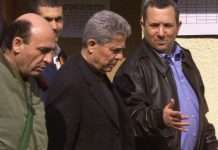Tripoli alcohol advertising ban draws fire
Nizar Hassan/Antoine Amrieh| The Daily Star
11 August/14
BEIRUT/TRIPOLI, Lebanon: A recent decision by Tripoli’s mayor to ban advertisements for alcoholic drinks in the city has sparked an uproar online. While the decision was praised by some Islamist movements in the city, it has been strongly condemned by others who described it as an ISIS-like policy. “Tripoli’s mayor, Mr. Nader Mohammad Ghazal simply wants to turn the city into an Islamic emirate with his ISIS-ist decision to ban advertisements of alcoholic drinks,” said an article by the online news outlet Lebanondebate.com.
The article called on the Interior Ministry to prevent more of what it called a decision “that brings back memories of extremist fundamentalist movements to the city.” In response to the criticism, Ghazal released a statement defending his act, saying “it was not a precedent,” because previous mayors had also taken similar measures. He said the step was a preventive measure that makes sense, especially considering the police’s goals to limit driving under the influence of alcohol. “[How] are drinks that lead to fading the mind advertised,” Ghazal said, “while the Internal Security Forces is patrolling in search for drunk drivers?” Ghazal also justified his decision by saying the ads were poorly timed, especially “in a phase where extremism is increasing in all directions.”
“The city cannot stand any provocation to any side,” Ghazal added, referring to Islamist groups that consider alcohol ads offensive. “Regardless, everyone already knows that the city’s restaurants have not served alcoholic drinks for many years, so I do not know why some are considering this provocative.”In a later statement, Ghazal’s defense diverted in to a legal justification for the removal of the advertisement. “This advertisement violated the rules of publication” he said. “[Rules] linked to the need for the local authority’s approval as well as the payment of license fees” he added. Tripoli’s Mayor said that the municipality removed the ad for legal considerations and not because of its content. Ghazal condemned the social media buzz over the incident, saying that online allegations aimed at violating the northern city’s communal unity and intended to distort Tripoli’s image. Mohammad Hajar, the public relations officer at Tripoli’s News Network, said it was true that most Tripoli’s restaurants avoid offering any alcoholic products. “There are only three to four places that offer alcoholic drinks,” he said.
“However, the Mina neighborhoods have many pubs and shops selling alcohol,” he said, “because they have their own municipality.” In defense of his position, Ghazal also said the ads were illegal and that they required special licenses. But his statement stressed that the other reasons for the decision were the most central. “This is not the first time we have removed billboards that we considered to be politically, socially or morally inappropriate,” he said.
In response, numerous activists from city and elsewhere started a social media campaign to protest Ghazal’s decision and voice their support for a diverse Tripoli that respects the liberty of its citizens. On Twitter, an account called Tripoli Loves Beer was created, and the #Tripoli_Loves_Beer was trending among protesters.
However, the most successful campaign so far was on Facebook, where a page was created with the same name, to which people, in particular residents of Tripoli, sent photos of themselves drinking beer or other alcoholic drinks. One of the users sent a photo of a party allegedly going on in Tripoli, while another humorously edited a famous photograph that had dozens of electoral posters for different politicians, replacing every poster with an ad for Almaza, Heineken, 961 or Effes beers.
According to Mohammad, an activist from Tripoli, the decision further alienates the city from other parts of Lebanon. “We do not need another incident to reinforce the stereotypes that Tripoli is an extremely conservative city with no individual liberty,” he told The Daily Star.
Although Ghazal said in his statement that the ads might increase extremism, the activist had a different take on the matter. “What actually strengthens extremism is adopting policies that make this culture look more legitimate,” he said. “Incorporating Islamic Shariah in municipal laws is definitely not the best way to confront extremism.”
“If that is truly the purpose, regulating Friday’s preaches at Tripoli’s mosque is the solution, not regulating the advertisements.”



















